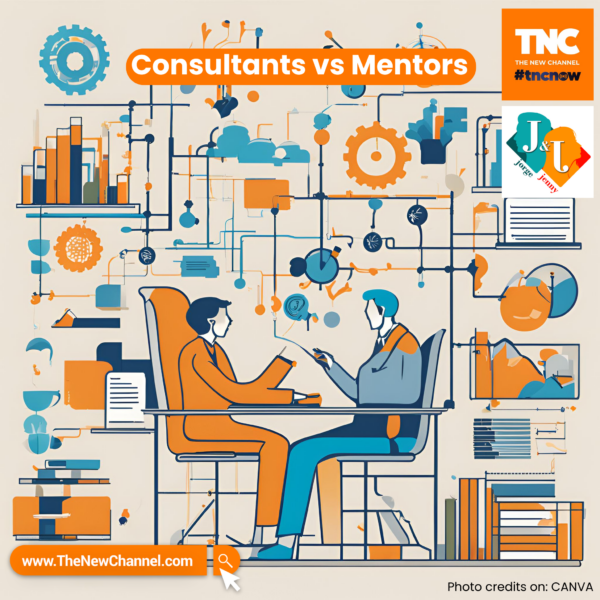J&J Article 030 | Consultants vs. Mentors
Words by Jorge Wieneke
Consultant versus Mentors: A Distinctive Perspective
A key distinction exists between consultants and mentors, rooted in their purpose, approach, and relationship with the people they serve. While both aim to provide value, their methods and philosophies diverge significantly. This essay explores these differences and emphasizes the vital role clients play in a consultant-client dynamic while contrasting it with the selfless guidance offered by mentors.
The Role of Consultants
Consultants provide expert advice for a fee, focusing on delivering measurable results. Their role is transactional, exchanging expertise for compensation. Yet, the ultimate success of a company is not the consultant’s alone.
Clients are instrumental at every step. They take the risk of hiring consultants, trust their advice, decide which recommendations to follow, and execute the strategies. While consultants provide the blueprint, clients build the structure, physically engaging with tasks, negotiations, and implementation.
Furthermore, consultants often rely on others’ stories and experiences rather than drawing from their own. This secondhand knowledge can provide useful insights but lacks the authenticity of firsthand learning.
Consultants must recognize their role as facilitators, not the sole drivers of success. True credit belongs to the client who assumes the risks and takes action to bring ideas to life.
The Role of Mentors
Mentors, in contrast, offer guidance based on personal experiences and do so without expecting compensation. Mentoring is about connecting with mentees, understanding their journey, and sharing insights to help them grow. Unlike consultants, mentors do not claim to be experts; instead, they humbly share their successes and failures.
Mentors and mentees share similar DNA, but mentors’ experience gives them an edge. This experience, gained through trial and error, is a source of genuine learning. Mentors practice what they preach, offering authenticity that theories and certifications cannot replicate.
Mentorship is not a business; it is an advocacy, a moral obligation, and a relationship. It is not about creating a personal platform or chasing status but about fostering growth in others. This intent is compromised when financial gain enters the equation. The moment a mentor charges for their guidance, they shift into consultancy, where financial motives alter the purity of the relationship.
Why I Choose to Mentor
People often ask if I accept fees for mentoring or why I choose to do it for free. My answer is simple: mentoring is my way of serving God and paying it forward. It is my way of expressing pure care and love, restoring treasures of love in heaven, and striving to be a tycoon not on earth, but in heaven.
For me, mentoring is about earning blessings and leaving a legacy of kindness and wisdom. It is an act of faith, a selfless contribution to others, and a way to create a ripple effect of positive change.
The Essence of the Distinction
Consultants and mentors serve distinct purposes. Consultants aim to generate income by solving problems through professional advice. Their focus is on ROI, metrics, and deliverables. Mentors, however, create relationships, investing in their mentees without expecting returns, motivated by a shared purpose of growth and giving.
To preserve the purity of mentorship, it must remain free from financial motives. Mentorship is about advancing others through the lessons of a life lived with purpose, trials, and triumphs. This selflessness makes mentors’ guidance invaluable.
Conclusion
The difference between consultants and mentors lies in their approach, intent, and relationship with those they serve. Consultants provide expertise for a fee, while mentors share wisdom selflessly, rooted in their experiences. Both roles are valuable but fundamentally different. Consultants must respect the efforts of their clients, and mentors must maintain the altruism that defines their advocacy.
For me, mentoring is not just a role but a calling. It is my mission to serve others through love and faith, honoring God by paying forward the blessings I have received. Success, to me, is not about wealth but about the positive impact we leave on others and the treasures of love we store in heaven.
Read more J&J articles🔽
https://thenewchannel.com/highlights/category/tnc-stories/jj-entrepreneur-entrepreneurship /
For more NEW stories, visit 💬 https://thenewchannel.com/highlights/
Check out 🌐 https://www.TheNewChannel.com
#onTNC #TNCNow #JandJ #Article030 #JeorgeWieneke #Consultants #Mentors #Mentoring #Mission #Obstacles #Success #Journey #FYP #ForYouPage #TheNewChannel #WatchTNCNow #AllThingsNew


